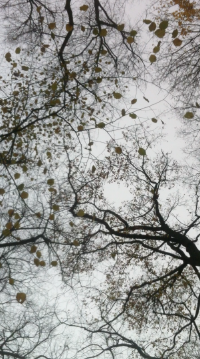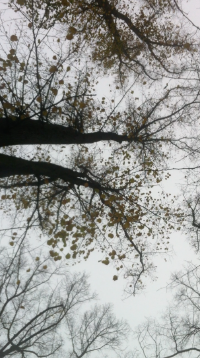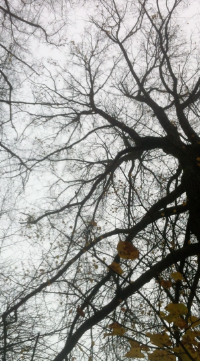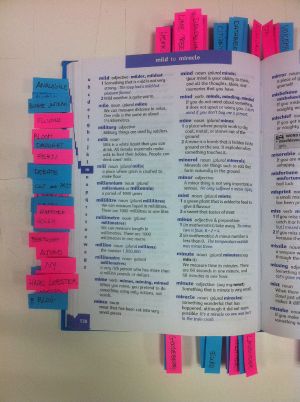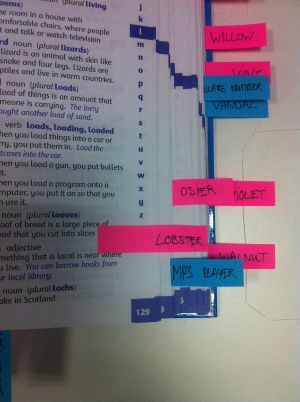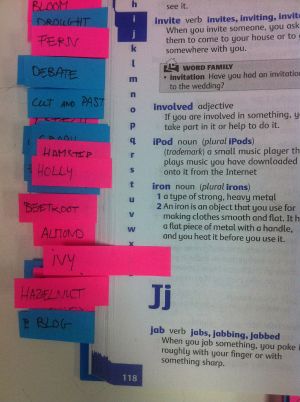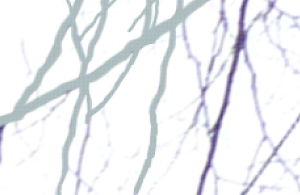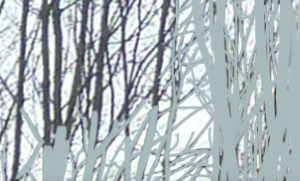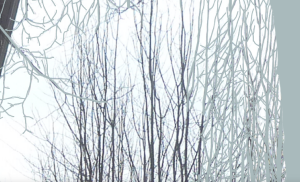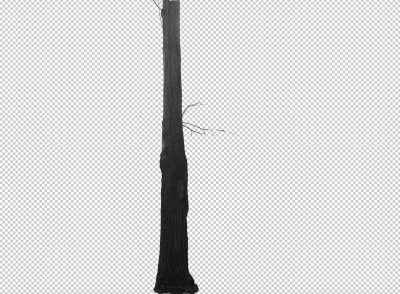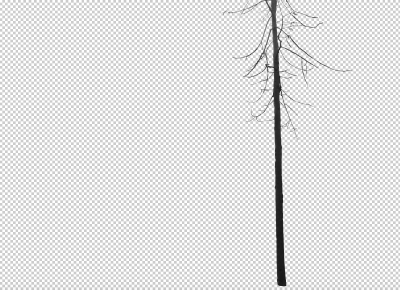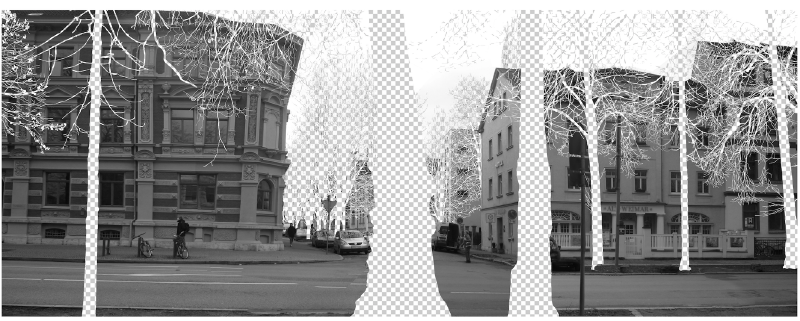| (5 intermediate revisions by the same user not shown) | |||
| Line 15: | Line 15: | ||
[https://www.amazon.de/Wurzelatlas-mitteleuropäischer-Ackerunkräuter-Kulturpflanzen-Wurzelatlas-Reihe/dp/3769007581 Wurzelatlas]<br> | [https://www.amazon.de/Wurzelatlas-mitteleuropäischer-Ackerunkräuter-Kulturpflanzen-Wurzelatlas-Reihe/dp/3769007581 Wurzelatlas]<br> | ||
[http://www.the-scientist.com/?articles.view/articleNo/38727/title/Plant-Talk/ The Social life of Plants]<br> | [http://www.the-scientist.com/?articles.view/articleNo/38727/title/Plant-Talk/ The Social life of Plants]<br> | ||
[https://www.goodreads.com/book/show/12527.Pilgrim_at_Tinker_Creek Pilgrim at Tinker Creek by Annie Dillard] <br> | |||
[https://www.goodreads.com/book/show/23597544-landmarks?ac=1&from_search=true Landmarks by Robert MacFarlane]<br> | |||
[https://www.goodreads.com/book/show/1344371.Wildwood?ac=1&from_search=true Wildwood by Robert Deakin]<br> | |||
===Amongst the Trees=== | ===Amongst the Trees=== | ||
| Line 22: | Line 25: | ||
[[File:tree1.png|200px]] [[File:tree2.png|200px]] [[File:tree3.png|200px]] | [[File:tree1.png|200px]] [[File:tree2.png|200px]] [[File:tree3.png|200px]] | ||
| Line 35: | Line 31: | ||
Hate / Love <br> | Hate / Love <br> | ||
Telling for a week at least 4 times a day to one seed group that you love them, and the other that you hate them. In the end the one that got more love seemed to have performed better <br> | Telling for a week at least 4 times a day to one seed group that you love them, and the other that you hate them. In the end the one that got more love seemed to have performed better <br> | ||
[[File:P1080771.JPG|300px]] [[File:P1080780.JPG|300px]] [[File:P1080791.JPG|300px]] <br> | [[File:P1080771.JPG|300px]] [[File:P1080780.JPG|300px]] [[File:P1080791.JPG|300px]] <br><br> | ||
no Music / Music <br> | no Music / Music <br> | ||
During the time span of a week one group of seeds was constantly listening to the album 'Plantasia - Music or plants and the people who love them'. The other group of seeds didn't hear anything. In the end it seemed that 'Plantasia' is only aimed at the people who love plants, because the plants itself did perform worse than the reference group<br> | During the time span of a week one group of seeds was constantly listening to the album 'Plantasia - Music or plants and the people who love them'. The other group of seeds didn't hear anything. In the end it seemed that 'Plantasia' is only aimed at the people who love plants, because the plants itself did perform worse than the reference group<br> | ||
[[File:P1080763.JPG|300px]] [[File:P1080770.JPG|300px]] | [[File:P1080763.JPG|300px]] [[File:P1080770.JPG|300px]] | ||
Here are some recordings of the growth experiments<br> | |||
[https://vimeo.com/247145949 Growth of Cat grass from seed]<br> | |||
[https://vimeo.com/250266700 Plant reacting to light]<br> | |||
===Drawing Plant Growth=== | |||
Having done the previous experiments resulted in me wanting to understand the movements the plants make with their roots. They look so funny and clumsy how they use them to stretch the seeds out into the light. So I made some observation drawings.<br> | |||
[[File:differentSeedShapes.jpg|900px]]<br><br> | |||
And then I followed one seed from the moment it started to germinate <br> | |||
[[File:singlePLantGrowth.jpg|900px]]<br> | |||
More and more I start to question myself what the relationship is between humans and the plants. how can I justify myself portraying human characteristics on them? And Why do people feel more empathie for things that move than for static things (animal vs. plants but also moving plants like the Mimosa vs. non moving ones). | |||
when does this feeling of empathie arrises? | |||
===Changing Surroundings=== | |||
After asking myself what this relation between humans and plants (/natural surroundings) is, I realised that I should look at it from the opposite perspective, from the human perspective. Previous works of mine have all dealt with this question of how can we perceive our surroundings and how can we/ do we perceive it differently? It was then that I stumpled upon this phenomenon, our daily vocabulary to describe our surroundings are chaging. | |||
[https://www.theguardian.com/books/2015/jan/13/oxford-junior-dictionary-replacement-natural-words Oxford Junior Dictionary replacement Natural Words]<br> | |||
If there are no more words for certain characteristics in the landscape, do we still observe them? Or do we tend to see more clearly things we know, are conscious off? | |||
So I first started to mark all the words in the dictionary that got removed, and also the ones that were newly added as their replacements. <br><br> | |||
[[File:foto 1_w.JPG|300px]] [[File:foto 2.JPG|300px]] [[File:foto 4.JPG|300px]] <br><br> | |||
''Holly'' & ''Fungus'' had to move because ''Drought'' was newly added | |||
''Panther'' & ''Lavender'' had to move because ''Endangered'' was newly added | |||
''Willow'' & ''Violet'' had to move because ''Vandal'' was newly added | |||
''Lobster'' & ''Hamster'' had to move because ''Chatroom'' was newly added | |||
It shows pretty poeticly how society is changing. | |||
Then I started to collect to objects to make a collage in the basement of M5 <br> | |||
<br><br> | |||
At the same time I decided not only to mark the removed words and to gather them again in the basement, but also to see how the environment would change if these words were not amongst our vocabulary anymore. So I made pictures of the walk I take every day from my home to the university. And started cutting out elements. first just with an utiliy knife: <br> | |||
[[File:foto_cuttingouttrees1.JPG|500px]] [[File:foto_cuttingouttrees2.JPG|300px]] <br> | |||
And later more precise on the computer (the light blue overlay was there to later make a clipping mask): <br><br> | |||
[[File:Bildschirmfoto 2018-01-25 um 22.59.55.png|300px]] [[File:Bildschirmfoto 2018-01-29 um 17.53.47.png|300px]] [[File:Bildschirmfoto 2018-01-29 um 18.02.21.png|300px]] | |||
<br> | |||
Taking these from the environment:<br> | |||
[[File:Bildschirmfoto 2018-02-09 um 15.53.08.png|400px]] [[File:Bildschirmfoto 2018-02-09 um 15.53.37.png|400px]]<br> | |||
Results into this: <br><br> | |||
[[File:Bildschirmfoto 2018-02-09 um 16.00.57.png|800px]] | |||
Latest revision as of 15:02, 9 February 2018
Artists Lab 17/18
Recommended Links
Different Ted Talks
Vierte Natur
Vierte Natur
Lore Kutschera
Guy Debord
Bordedom Research
Additional Links
Dérive
Self-Organization in Biology
Wurzelatlas
The Social life of Plants
Pilgrim at Tinker Creek by Annie Dillard
Landmarks by Robert MacFarlane
Wildwood by Robert Deakin
Amongst the Trees
Being lost in my inspiration for the project I decided to go and spent some time with the topic of my interest; trees. In this first observation I realised that I was trying very hard to understand them. To identify their different personalities, to understand how they reacted on the environment and to make clear if they were passive or active beings. None of these questions I found an answer to. If only they could send us some more messages/information than this..
Growing Plants
Growing seeds of Cat Grass under different conditions.
Hate / Love
Telling for a week at least 4 times a day to one seed group that you love them, and the other that you hate them. In the end the one that got more love seemed to have performed better
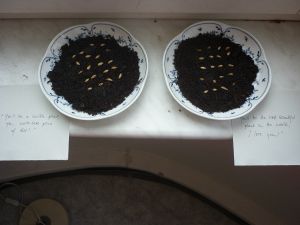
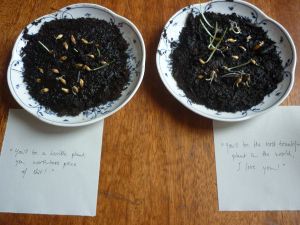
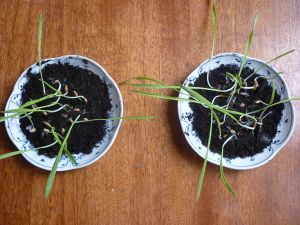
no Music / Music
During the time span of a week one group of seeds was constantly listening to the album 'Plantasia - Music or plants and the people who love them'. The other group of seeds didn't hear anything. In the end it seemed that 'Plantasia' is only aimed at the people who love plants, because the plants itself did perform worse than the reference group
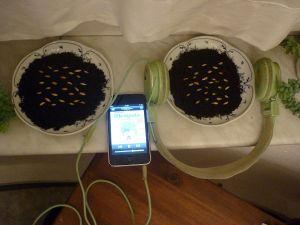
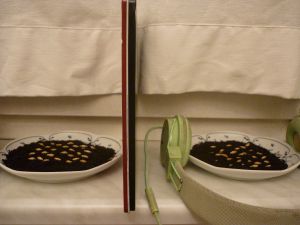
Here are some recordings of the growth experiments
Growth of Cat grass from seed
Plant reacting to light
Drawing Plant Growth
Having done the previous experiments resulted in me wanting to understand the movements the plants make with their roots. They look so funny and clumsy how they use them to stretch the seeds out into the light. So I made some observation drawings.
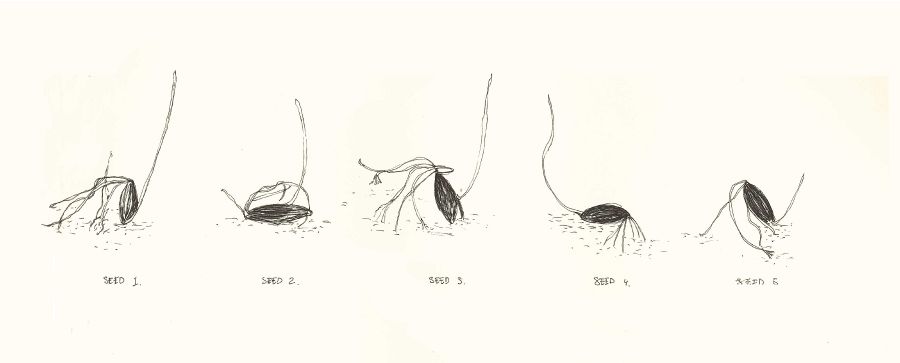
And then I followed one seed from the moment it started to germinate
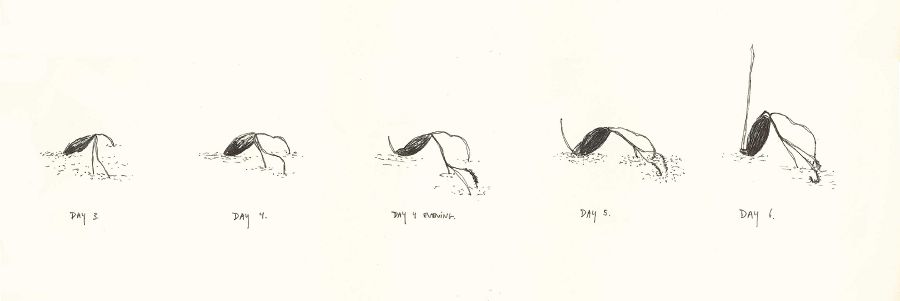
More and more I start to question myself what the relationship is between humans and the plants. how can I justify myself portraying human characteristics on them? And Why do people feel more empathie for things that move than for static things (animal vs. plants but also moving plants like the Mimosa vs. non moving ones).
when does this feeling of empathie arrises?
Changing Surroundings
After asking myself what this relation between humans and plants (/natural surroundings) is, I realised that I should look at it from the opposite perspective, from the human perspective. Previous works of mine have all dealt with this question of how can we perceive our surroundings and how can we/ do we perceive it differently? It was then that I stumpled upon this phenomenon, our daily vocabulary to describe our surroundings are chaging.
Oxford Junior Dictionary replacement Natural Words
If there are no more words for certain characteristics in the landscape, do we still observe them? Or do we tend to see more clearly things we know, are conscious off?
So I first started to mark all the words in the dictionary that got removed, and also the ones that were newly added as their replacements.
Holly & Fungus had to move because Drought was newly added Panther & Lavender had to move because Endangered was newly added Willow & Violet had to move because Vandal was newly added Lobster & Hamster had to move because Chatroom was newly added
It shows pretty poeticly how society is changing.
Then I started to collect to objects to make a collage in the basement of M5
At the same time I decided not only to mark the removed words and to gather them again in the basement, but also to see how the environment would change if these words were not amongst our vocabulary anymore. So I made pictures of the walk I take every day from my home to the university. And started cutting out elements. first just with an utiliy knife:
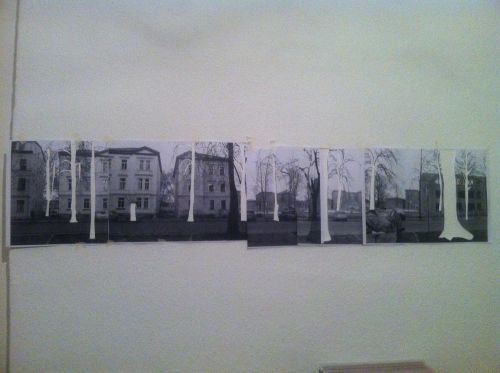
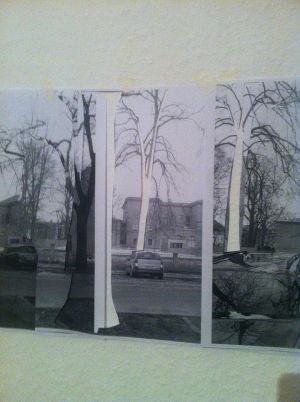
And later more precise on the computer (the light blue overlay was there to later make a clipping mask):
